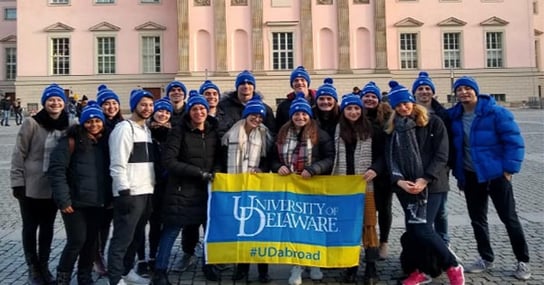
This past winter, Horn Entrepreneurship assistant professor and Faculty Director of Social Entrepreneurship Stephanie Raible led a group of students on the first ever Social Entrepreneurship study abroad trip.
The winter 2020 trip, sponsored by the Department of Human Development & Family Sciences and Horn Entrepreneurship, took students to Munich and Berlin in Germany to see the cities and the unique social entrepreneurship ecosystems present in them. Social entrepreneurship is an approach towards creating businesses that are focused on finding solutions to societal, cultural, or environmental issues, with a strong emphasis on the impact the organization has over financial success. Students tackled a full course load while overseas, taking classes that were connected with the visits and activities of the trip. While the course was filled with numerous tours and visits that showed the cultural background of Germany, many excursions in their busy schedule included meeting with nonprofits, socially conscious businesses, and other enterprises working for the public good in Germany.
Professor Raible was able to integrate a lot of hands-on learning into many of the group’s activities, with workshops at many unique social ventures across Munich and Berlin. There was even a volunteer experience allowing students to really get the full experience of laboring amongst Germany’s businesses. Working in Berlin at Textilhafen, a textile recycling shop that clothes the homeless, the travelers spent almost 3 hours learning and implementing the processes behind weaving and upcycling. The outings provided a perfect opportunity for students to network, interacting with a wide range of people from different backgrounds. They were able to meet similarly aged individuals during their visits to Joblinge, a job service program for young adults who may have found themselves out of the workforce, and Social Entrepreneurship Akademie (SEA), a program that educates driven, community-focused individuals and helps them work towards serving the public. Joblinge guided the class through an activity showing some of the process that young Germans have to complete in order to join the program. While at SEA our group exchanged presentations with SEA students. The SEA students pitched their social ventures, while Professor Raible’s class shared what they had learned about Germany’s entrepreneurship hemisphere.
One of the central focus points of the study abroad program was seeing the entrepreneurial ecosystem of Germany. According to Professor Raible, the students were especially in awe at the range of businesses working for social good.
“Some of the students were coming from a business perspective, a finance perspective, and this was the first course they'd really been exposed to something on this end, and I think they might have been surprised that there's more of a world that's in-between the traditional charity nonprofit and the business sector. I think oftentimes within business classes its insular, you’re thinking about driving profits, making sure your investors are happy, and so a lot of students were surprised that there’s an equivalent world that is able to be financially stable and sustainable through other pathways, and that they are able to do enterprising things that are also contributing towards social good.”
The interactions with varying levels of social entrepreneurship left a strong impression on a lot of students in the course, who were surprised to hear that there are similar systems located in cities throughout the United States. Stephanie hopes her class will come back to the states with a drive to seek out the social ecosystems in place around them in Delaware.
“I think it opened up a new world to them, I could even see it in their assignments. A lot of them were saying ‘Wow, all this exists in Germany, we don’t have this in the states’, and I had to constantly reframe saying, ‘Believe it or not this exists in the states, this whole sector that you’re experiencing here we also have foundations for in the states. We have a lot of social enterprises in the states.’ I think that that was opening up a new world for them when they were thinking about coming back, and I think that being on this trip they’ll look for that when they’re here.”
About Horn Entrepreneurship
Horn Entrepreneurship serves as the creative engine for entrepreneurship education and advancement at the University of Delaware. Currently ranked among the best entrepreneurship programs in the US, Horn Entrepreneurship was built and is actively supported by successful entrepreneurs, empowering aspiring innovators as they pursue new ideas for a better world.

